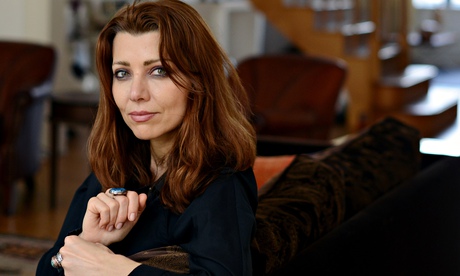“The feeling of being ‘in between things’ is good for [writers],” said Elif Shafak in a 2014 interview. This delight in liminal spaces forms the bedrock of her 12th novel, which charts the moving story of Kostas and Defne Kazantzakis, young lovers in a painfully divided postcolonial Cyprus – one Greek and Christian, the other Turkish and Muslim – and the emotional price they continue to pay after moving to England.
Early on, Shafak hits us with a perfect juxtaposition of beauty and violence, imagining the day when two corpses, lost in a well, “swim toward the chink of sky overhead, shimmering in the refracted sunlight”. In a London scene, anthropologist Defne and her colleague interview an elderly Cypriot for his war memories but are chased away by the man’s son for invading his privacy. Sheltering in a pub, “both women were laughing so hard … the other customers began to look … no one imagining it was pain they were setting free”. The book is stuffed full of such transitional experiences, where joy and beauty are under threat, or on their way to becoming something else entirely.
The novel moves back and forth in time and place and is split into three narratives. In 2010s London, we meet 16-year-old Ada, daughter of Kostas and the recently deceased Defne. Ada’s mourning for her mother is becoming painfully public, as a video of her distress, shot by a schoolmate, goes viral. Her parents have protected her from their past in Cyprus, and Ada doesn’t know her Cypriot family – “She’s a British child” – but the arrival of her maternal aunt, Meryem, unravels the truth.
Back in 1974 Cyprus, Defne and Kostas were forbidden lovers. The couple’s clandestine meetings took place at The Happy Fig, a taverna run by sympathetic owners. The catastrophic events that follow are watched by the resident parrot Chico – and by the fig tree growing in the middle of the building. It’s this tree that claims the third narrative, a sapling plucked by botanist Kostas and replanted in their new English backyard, growing up alongside Ada. The fig later witnesses the grieving father and daughter and is a mouthpiece for Cypriot history, illuminating human carelessness and hypocrisy.
As a heartbroken Kostas ineffectually circles his quiet teenager, Aunt Meryem arrives with two suitcases emblazoned with pictures of Marilyn Monroe and as many recipes as aphorisms, plaiting and replaiting her hair and never knowing when to mind her business. Every culture has an auntie like her. “‘Signs of the Apocalypse,’ mutters Meryem, turning off the TV. ‘It’s climate change,’ says Ada, without lifting her gaze from her phone.” She is a wonderful counterpoint to Ada’s teenage superiority, and the women eventually come to mirror each other in their vulnerability at a time of change. “‘I blame the menopause,’ says Meryem. ‘I was always tidy and organised … I don’t want to clean up any more.’”
The Island of Missing Trees asks us important questions about losing home, about coping and secrets. What do those of us who are immigrants do with our yesterdays? How are our children affected by our pain? Ada has no Cypriot culture and what’s missing wounds her; Shafak suggests that generational trauma is inevitable, offering a take on depression that will feel familiar to many communities. “We are afraid of happiness. From a tender age we are taught … that for every morsel of contentment, there will follow … suffering …” I read this novel during Euro 2021, and I thought about being afraid of happiness, in an England rocked by the racism that many knew would follow second place. In Shafak’s fictional world, after violence devastates The Happy Fig, Defne and Kostas make love for the first time, clearing away the nettles on a hill behind the taverna – their own tiny hopeful revolt against despair. But this is not a love story for the blinkered; decades later, Ada’s mother might try to keep painful events from her child, but Shafak rightly insists her readers witness the real-life devastation of colonialism.
Given Shafak’s affinity for the natural world, with whole pages of soaring, rich detail about songbirds or butterflies, the occasional cliched sentence was a surprise. No brilliant writer ever needs her character to pace a room “like a caged animal”. Especially when she so beautifully honours a tiny ant queen: “Here she mated and chewed off her wings as though discarding a wedding dress.” The personification of the fig tree is a mixed bag, a device I worried might infantilise this adult text. And the more “human” the tree – its love for Kostas, the way it feels “jet lagged”, even its concern for Ada – the less interesting, even mawkish, it seemed. Add the contrivance of small creatures whispering plot points to its branches and for me, coincidence trumped craft. But when Shafak goes deeper into its arboreal life, the tree’s voice is a delight: reports of the mischief made between carob and fig; the subterranean world of roots; the gorgeous diversity of bees; the constant noise, textures and vulnerability of a perpetual ecosystem. And when the novel’s sure and towering end arrived, nearly all Shafak’s decisions made sense, moving me to tears and humbling me with the confidence of a storyteller for whom every decision is deliberate. This is a beautiful novel – imperfect, but made ferocious by its uncompromising empathy.
• Leone Ross’s This One Sky Day is published by Faber. The Island of Missing Trees by Elif Shafak is published by Viking (£14.99). To support the Guardian and the Observer buy a copy at guardianbookshop.com. Delivery charges may apply.
• This article was edited on August 9 2021 to correct the spelling of a character’s name.









